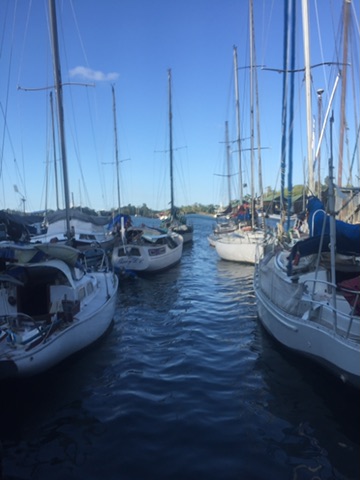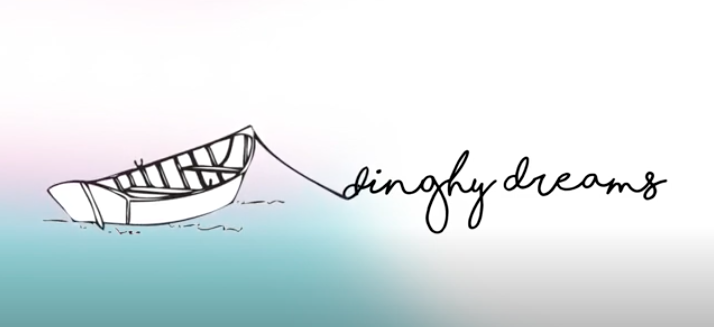
The pillow talk had come and gone by the time I’d arrived at the marina. The Capt. had apologized and assured me that he could of course take care of a pillow and said his oversights were due to stress. I apologized for saying “are you fucking kidding me,” one too many times. All was well enough. I was enjoying being in a foreign country, on foreign waters, and meeting many foreign sailors. Some good times were had and there were moments where morale was high and we functioned as a good enough team. I washed the boat (which was no easy feat having been at a dock in the jungle for nine months). I organized and cleared the cockpit. I did some painting. I cleaned up the Captain’s messes from projects and I tried my best to feed us with the meager provisions onboard at the time.
“I haven’t been eating,” was one of the first things he said to me when I arrived. “I haven’t been taking care of myself.”
I soon realized what he meant was he wanted me to do things like his laundry (which I didn’t do) and keep him fed (which I tried to do because I was also hungry) while he readied the boat. Any efforts I tried to take to be involved as crew were meant with serious backlash. I found myself laughing awkwardly, often, raising an eyebrow at his responses to what should have been the simple procedure of acquainting a new crew with the vessel.
There were things I wanted and needed to know before leaving; like the sail inventory, the reefing system, the route plan, ground tackle info, a run down on the electronics. We needed to discuss weather patterns, provisions and water for the trip, but none of this was possible. The captain would dismiss me, blatantly ignore me, and just generally be rude when I asked questions. He would respond as if his patience was on thin ice, as if I was being extremely annoying in my efforts to know the boat before setting off into the western Caribbean sea for several days at a time. I had dropped everything to come down there and help him for no monetary compensation and I was only concerned with my own safety and basic needs for survival at sea. He should have been acting gracious.
I eventually became worried about going to sea with him. I wondered how he’d handle an emergency. Luckily the boat was very simple and similar to mine, so I was able to observe things enough to get a sense of most of the systems, but there was something in my core that was very bothered by his inability to go over the boat together, and how he thought that it wasn’t important or necessary. I began to distrust his abilities as captain. Why should I have to be on my own learning his boat? It didn’t feel safe or right.
On the third or fourth day it was time to start thinking about untying from the dock. We still hadn’t provisioned and I still didn’t know which water tanks would contain filtered water and which would contain washing water. He had already made it clear that we would be provisioning on a budget, but then he told me with a staunch attitude that he would give me a certain amount of money and if I couldn’t provision within that then “oh well.” He said this in passing, walking past me carrying planks of wood for a sun awning that he never finished building. I took a breath, got up from my chair and followed him.
“Look,” I said as calmly as possible, “I’m not going to buy a bunch of outlandish items. It will cost what it is going to cost. I’m not going to go with you on the trip if this isn’t understood.”
He conceded, quickly. But the damage was already done. He’d tell me to get snacks, and then say nuts were too expensive. He told me not to worry about how much propane we had. He told me not to worry about the weather. He told me not to worry about water. He. Had. It. All. Under. Control.
I was pretty stunned. I was in a foreign country. I was starting to feel exhausted from having to fight for information and for what seemed like the most basic of needs. By the time he agreed to not capping the provisions budget, I was so anxious and exhausted I provisioned poorly with rice, vegetables, fruit, and eggs. Lots of them, but it all required massive energy to cook in an environment that was not only hostile due to its humidity, bugs, and punishing sun—but had become hostile between the two of us.
I contacted my friends back home. I talked to other people in the marina. I contacted the mother of his children. Some said I should leave, but I felt that if I left I was weak, I would return home with my head held in shame, that I was a failure. His partner at home told me he was responding to stress, that he was a good person, that he needed my help, but she would understand if I left. She talked to him and he apologized to me, again, in tears.
“I’m just so stressed out about money,” he said. “I just want to get home to my kids.”
I understood his predicament. I’d felt buried by the burden of my boat on more than one occasion. I know what stress, pressure, anxiety and depression can to do the mind. But it wasn’t an excuse for his behavior, and going to sea with a captain in that mental state seemed troublesome to me. At my weakest times emotionally, I didn’t bring someone else onto my boat. But I still wanted the sea time. I had come there with the intent to put to sea and damn it I was still going to do it.
I told him I was no longer doing this as a friend, and he’d have to compensate. I told him he’d have to pay me the amount it would cost for him to fly me home (a mere $200), and that he’d have to give me a solar panel and storm jib once we reached the United States. He was selling the boat anyway and had extras of each. Those were the terms. Otherwise I’d walk.
He pouted and said things like “this wasn’t our agreement,” and, “I don’t feel this is fair.” I made him shake my hand and look my in the eye. He then gave me a speech about how he was the captain. I just glared at him. I had no energy left to argue.
I felt better after asserting myself but nothing really changed. I tried to take a passive role. I still believed in the boat. When he said the route was solid I took his word for it. When he said the weather was good I believed him. He said there was one period where we might see strong 35 knot trade winds but they’d be on our stern quarter. I didn’t ask about the 35 knots, if it was part of regular trade wind behavior or some other weather system. I tried to treat this as a job with a bad boss, and as a practice for myself in trying not to be the captain. I convinced myself that was a good idea. I had managed to piece together a float plan to inform my contacts back home but left the rest to him.
Things continued to deteriorate and by the time we reached the bay where the sail repair and rigging shop was located up the river, we weren’t really speaking. When a young, dreadlock sailor girl tied us up to the riggers dock and looked at me to say, “What a beautiful little boat you have here.”
I quickly said back to her, arms crossed, “It ain’t my boat.”
We took an immediate liking to each other. She was at the dock refitting her classic wooden sailboat and works as a charter captain in Belize. I told her everything. She tried to rationalize it.

“You’ve already decided you’re staying, right? He’s just really stressed out. That’s not an excuse for his behavior but you trust the boat and he got down here, didn’t he? Just treat it as a job like you said. You need a ride back to the state’s anyway and you said you’d rather go by boat. Get your sea time. Get the items you negotiated. And get off the boat.”
After the rigger went up the mast I pulled him aside and told him briefly the scenario. He said the rig and sails were solid. That the captain was not an idiot, he was just nervous.
The folks at the dock, all sailors with a keen local knowledge, tried to tell the captain to stay inside the reef for the first 150 miles. It would be easier to make time before picking up a fair current with the Gulf Stream, but the captain wanted to go offshore the entire way.
The night before we were outbound to sea I went to the bar with my new friends and had a conversation with one of saltiest old salts I’d ever met. I started to ask him about storms.
“You don’t just get ‘caught’ in a storm,” he said. “If the captains not an idiot, he’ll have looked at the weather before going. He got down here didn’t he? You said you trust the boat. If you stay inside the reef to Belize City you pretty much pick up the gulf stream parallel with the pass .”
“Yeah I trust the boat,” I said. “Yeah he got down here. Yes he’s looked at weather. But he doesn’t want to stay inside the reef. He wants to go offshore the whole way. He’s already been told to stay inside the reef by local sailors.
“Well,” he said in his Australian accent, fifty years experience at sea, “Unless you want to get in a big, dangerous fight at sea, don’t tell him what to do when you’re out there. Treat it as a job, and get home.”

